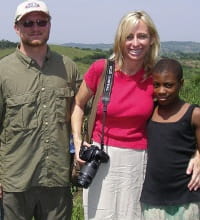Volunteerism led Dr. Shannon Irvine ’12 to found Mosaic Vision to help AIDS orphans in Uganda.

Dr. Shannon Irvine shown with her husband, Micah, and a child in Uganda.
A blossoming young woman stands before Dr. Shannon Irvine ’12. Dorcas was a child when they first met in Uganda, but she is now a high school student who talks about becoming a lawyer. Her brother Daniel just started his first year of college. Their futures wouldn’t have been possible without Irvine’s intervention in 2005.
When she first met the siblings, they were living alone in a crumbling mud home that was a breeding ground for insects and disease. And Dorcas, who is HIV-positive, was becoming sicker each day. AIDS orphans will compose nearly 40% of future adults in Uganda. “I remember holding Dorcas and telling her she had to become a leader for her community,” Irvine recalls. “Walden inspired me to act, boldly knowing that I can influence social change, one child at a time.”
Today, Irvine and her husband, Micah, run the nonprofit Mosaic Vision, which has supported more than 300 AIDS orphans since its inception in 2004. She fleshed out its mission a year after participating in her church’s trip to Uganda, where she met Dorcas and Daniel.
Child-headed households are common in Uganda. One of Mosaic Vision’s primary goals is to place caretakers, often widows, in child-headed homes or support grandparents who have already stepped in to help. It starts with the basics—rebuilding homes to stave off disease-carrying insects and initiating community-oriented projects like rainwater collection.
But children remain the focus of the nonprofit. Mosaic Vision also covers the costs for children to attend school and access medical care. These basics, paired with a guardian, are necessary not only to allow these children to grieve the loss of their parents, but also to allow them to continue to learn before becoming fully independent adults.
Irvine, who earned her MS in Psychology from Walden in 2007 and completed her PhD in Psychology in November, traveled to Uganda in June 2012 as a culmination of her dissertation research on the prevalence of post traumatic stress disorder (PTSD) among orphans in Uganda.
In a sample of 800 children, “we discovered that nearly 12% of children orphaned by AIDS have PTSD. The only comparable group are frontline soldiers in Afghanistan,” Irvine reports. While the problems are very real, Mosaic Vision’s impact is, too. “It’s exciting to see the children go from a hopeless situation to become leaders and change agents for their communities.”
Irvine plans to continue her research in Uganda to figure out the best ways to treat children with PTSD and other emotional disorders. “I’d like to get scholars involved in studying the effectiveness of different treatments so our research can become a model for rural communities in Africa,” she explains.
Beyond research, Irvine also stresses the importance of mobilizing local community leaders, since she is based in California. “We’re very involved, but we really rely on our Ugandan staff to make it a Ugandan organization,” she explains. “These leaders have become examples in the homes of orphans, which is the first part of organic change in their communities.”
Her next goal is to open a counseling center. In the meantime, the nonprofit is focused on locating funding and training Ugandan staff members to address mental health issues.
Although she runs the nonprofit full time, Irvine was formerly a CEO who dedicated her vacation time to philanthropic projects. “The more I went, the more I realized that this is what I’m called to do,” she says. “I knew I needed to make a difference. I wanted to earn my degree to assist people more proficiently.”
Have you gone on an international trek? Tell us the details by emailing [email protected].



